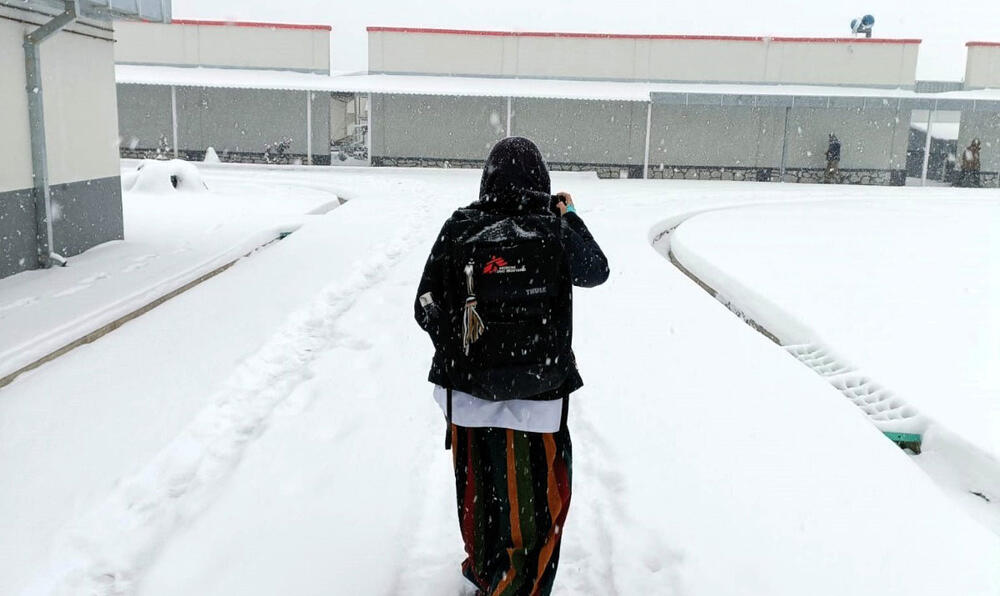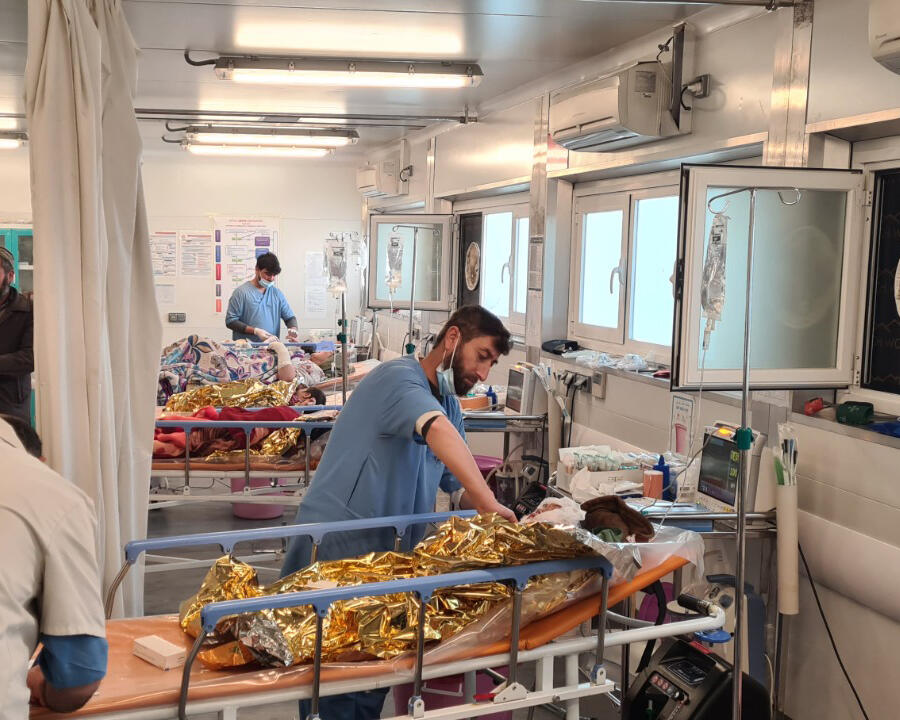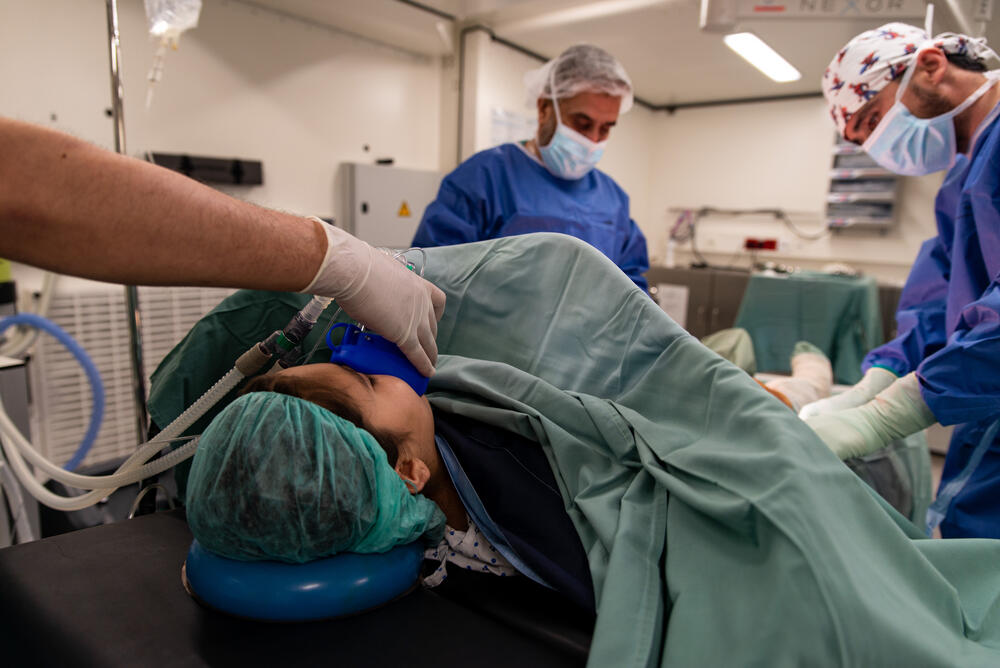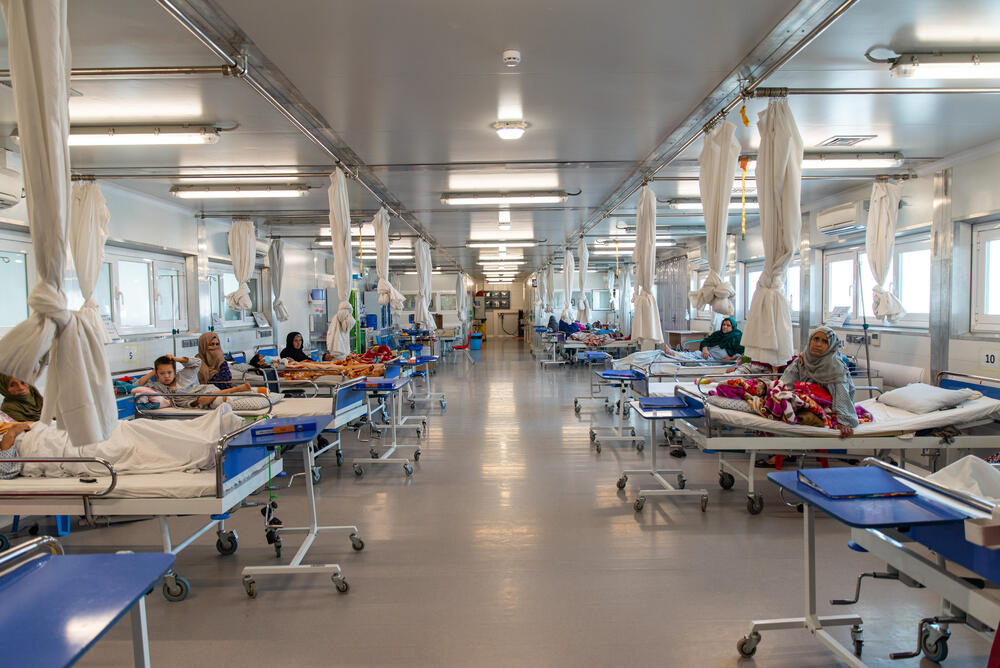"Do you know what the most frightening thing is?": Extracts from an emergency in Afghanistan
It’s the middle of the night in the depths of the freezing Afghan winter and a struggling family is about to experience a terrifying accident.
On-call in a nearby MSF hospital, nurse Diana Pereira de Sousa and her team have no idea of the challenge that’s coming next, let alone the journey they are about to begin with their patients.
Here, including extracts from her diary, Diana shares the story of a family she’ll never forget.
“Another cold morning! This week the temperatures are hitting -22 Celsius at night and maximums of -10 during the day. I have never experienced cold like this in my life.”
I wrote this in Kunduz, a city in northern Afghanistan that’s close to the border with Tajikistan.
Médecins Sans Frontières / Doctors Without Borders (MSF) runs a trauma centre there, with an emergency room (ER), three operating theatres, wards and outpatient departments. I was there for nine months as a nurse supervisor.
Today, as I leafed through the diary I kept, I thought of the harsh winter that Afghans face for four intense months every year, and the one night that I’d tried to sleep without the warmth of the AC.
I’d already woken, freezing, despite my double socks and thick covers. I turned the AC back on immediately… but many families in this region do not have the money for food and clothes, let alone safe heating. The houses are not well insulated, jobs and resources are scarce.
In the red zone
“Can you come to the ER? It’s urgent.” It was Boyd, one of our doctors.
When I got there, I saw some of our senior medics talking fast. Five burns patients had been rushed to the ER.
I had no idea what would come next.
In the red zone there was a woman and four young children, all of them with second and third-degree burns. The red zone is where we treat patients in critical, life-threatening conditions.
Assessing the patients, it was difficult to understand how extensive the injuries were, the percentage of their body surface that was burned. This was not like the burns we’d seen before – when a toddler spills hot water, for example.
Although in the past we’d admitted patients with burns related to trauma, the complexity and severity of these injuries required a higher level of care than we could offer.
“Do you know what the most frightening thing is? Being in a resuscitation room with five children, four of them awake… and none of them crying”
£25 could pay for 12 surgical gowns for our doctors and nurses to use during surgery
The generosity of people like you means expert MSF medical teams can deliver essential medical care to people across the world.
We decided to admit the woman and three of the children. The child in the most critical condition would be referred to the Kunduz Regional Hospital. He was at risk of losing his airway and we did not have the capacity to ventilate patients.
As we were sharing the plan with the ER team, another three patients arrived, also with severe burns. A man, a pregnant woman, and a 10-year-old child, unconscious.
Not an option
As the new arrivals were rapidly assessed, the confusion was clear on all of our faces. What had happened? And crucially, were there more patients coming?
Still unsure if we were dealing with a mass casualty incident like a bombing, we learned that referral to the regional hospital was not an option. The last three patients had been sent from there: they did not have the capacity to treat them.
That meant we had at least five children and three adults, all with severe injuries, and we were on our own.
Everything went so fast. In a few minutes we had all the patients on IV fluids and the first set of observations done. Around me, the red zone was full of people. We needed to make decisions, quickly.
Together, we came up with a plan.
Every department in the hospital adapted to give these patients the best possible chance of survival. The list for the operating room was cleared of all non-emergencies, patients who could be safely discharged were moved from the intensive care unit (ICU) and inpatient department to provide beds.
The line in my diary captured how we felt...
“Do you know what the most frightening thing is? Being in a resuscitation room with five children, four of them awake, with 30-50 percent of their bodies burned, and none of them crying.”
I could hear the staff talking. I could hear the rustling of the foil survival blankets. But I could not hear the patients themselves. Very few people like to hear a child cry, but, in a hospital, it can tell us a lot about their condition.
Involuntarily immobilised by the burns covered with thick gauze, our patients were also not moving. Their stillness and silence were heavy in the room.
Automatic mode
In medicine, sometimes you go into ‘automatic’ mode. I think we all did that day. In a fast but smooth way, the patients were given the best treatment that we could with the knowledge and resources that we had at that moment.
In the moment I don’t think we were aware of the magnitude of what was happening and what would come from there…
When someone is severely burned there is an inflammatory response throughout their body to try to compensate for the damage. One of the consequences is that patients continuously lose fluids from the burns, which can lead to severe dehydration and electrolyte imbalance. Without proper treatment, the body can start to shut down.
Our ICU was transformed into a burns unit, where six of the patients were admitted for close monitoring, aggressive fluid therapy, and pain management.
Burns patients are at heightened risk of infections, so the ICU team (cleaner, nurses and doctors) assisted in deep cleaning the unit even more thoroughly than normal and adopted the use of personal protective equipment, such as gowns, gloves, and face masks. It was magnificent to watch the team adjust with such speed and dedication.

Help us prepare for the next emergency
The explosion. The aftermath.
We desperately wanted to talk with the patients and their family members, but they only spoke Uzbek, which meant very limited numbers of staff could communicate with them.
Eventually, we learned what had happened.
The family had gone to the home of a relative to offer their condolences after a burial ceremony. It was so cold that the gas cylinder froze, so they brought it into the house and placed it near a small heater to thaw.
Some of the children were sleeping when the gas cylinder exploded, but they managed to get everyone out before the entire ceiling collapsed. One of the family had a video of the destroyed house. They described what happened with tears in their eyes.
Very sadly, the severity of his burns meant that the oldest child, a little boy of around ten years old, passed away less than 36 hours after he was admitted.
“I want to reassure these children and I don't know how; I use touch and facial expressions and try to somehow ask their mother to do the same, but honestly, she looks so young that she needs comfort and reassurance, too”
Despite the loss of their young patient, our team kept the faith. They worked incredibly hard to care for the other burns patients, including the little boy’s father and two sisters.
Later, I wrote in my diary…
“I'm very proud of the ER and ICU teams. They are a reflection of resilience and hard work. And this is really an incredible nursing challenge, particularly in nutritional and fluid assessment and management. I can say: they shone.”
As the weeks went by, we could see the complexity and prolonged hospitalisation that the family would face. Every week each of them would have two or three surgeries to remove the dead tissue and prevent infection.
“Those children's eyes are fearful.... Almost all of them with bandages on their faces, hands, and legs. They speak Uzbek, and one of the caretakers speaks a little Dari, but a lot of information is lost in translation. I want to reassure these children and I don't know how; I use touch and facial expressions and try to somehow ask their mother to do the same, but honestly, she looks so young that she needs comfort and reassurance, too.”
It is very difficult to see children who do not smile, so as the children gradually became stronger, the ICU team took it as a challenge to make them feel safe and able to play.
We used music, cartoons, and dolls made by inflating surgical gloves like balloons.
One day, we realised that they had stayed almost two months in the ICU without seeing the sky, so we found a way to take them outside for contact with fresh air and nature.
To hold all that joy
Three months after their admission, four of the family were well enough to be discharged.
I won't forget the two little boys, Abdul and Abbas*, waving to me when they later returned to the hospital to have their dressings changed. Seeing them walk and smile, like typical children, was so rewarding and made me hopeful for the two little girls who were still in hospital.
At that point, the girls’ father was transferred to a burns unit in Kabul, and the girls, Sima and Habiba*, were well enough to leave the ICU and be treated on the inpatient ward.
Looking back, it is not easy to put into words how I feel about these patients….
One of the things I remember most was the first time Abdul laughed. It was two weeks after they were first admitted. Gradually, we were helping the children to feel comfortable and built trust.
Then one day, one of the nurses tried gently tickling Abbas and was rewarded with a shy smile. Then she tickled Abdul and we got the first genuine laugh we had heard. Suddenly the team was contagious with laughter and that moment gave us the boost of energy that everyone needs to keep up hard work.
Those first two weeks had been intense and uncertain, but hearing Abdul laugh… I felt that my chest was not big enough to hold all that joy.
*Names changed to protect patient identities
MSF in Afghanistan
Médecins Sans Frontières / Doctors Without Borders (MSF) provides emergency, paediatric and maternal healthcare in Afghanistan, which has one of the highest maternal mortality rates in the world.




